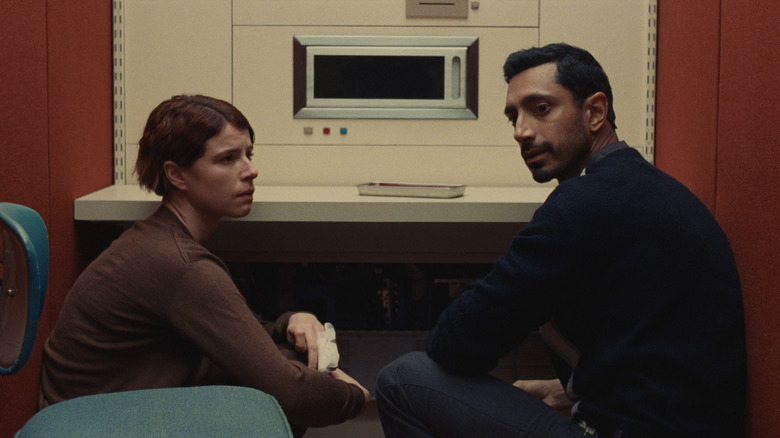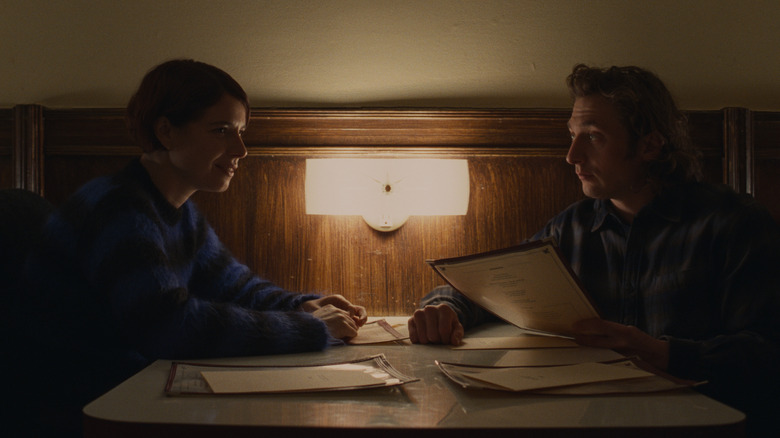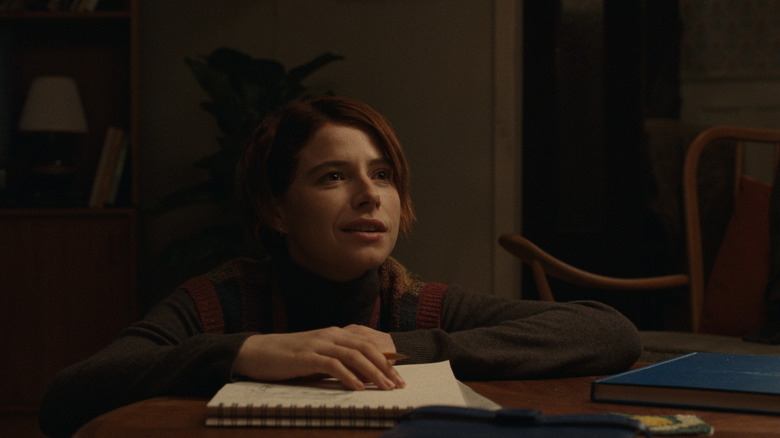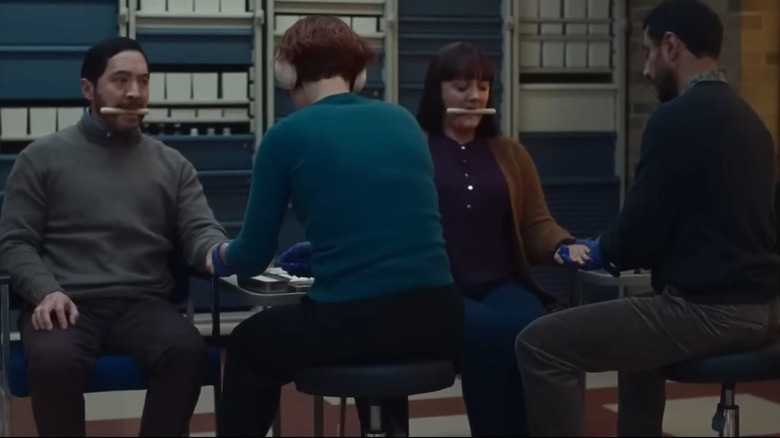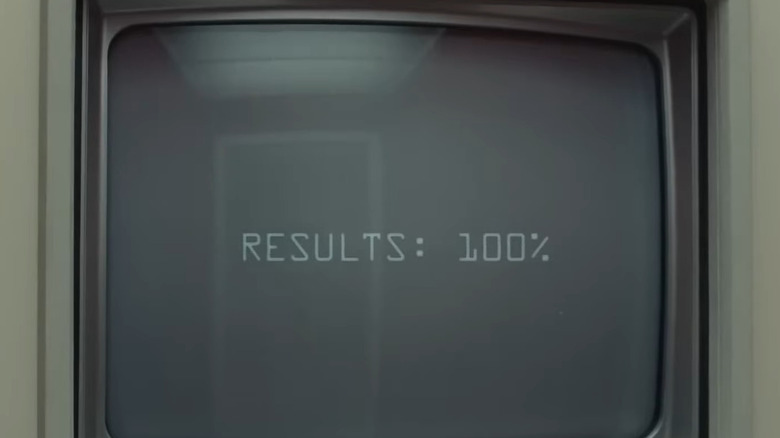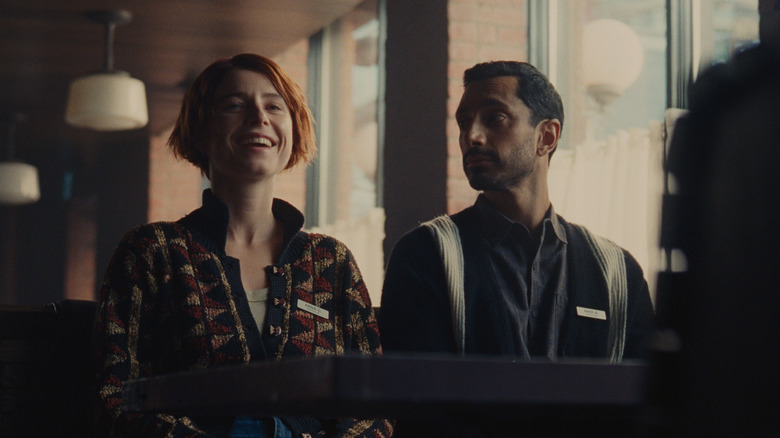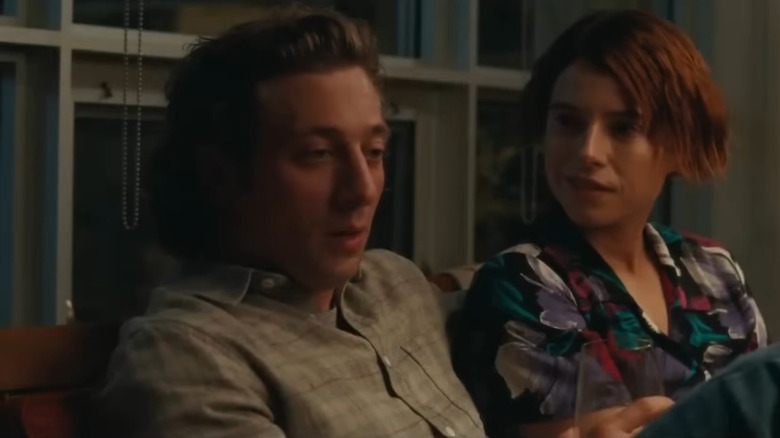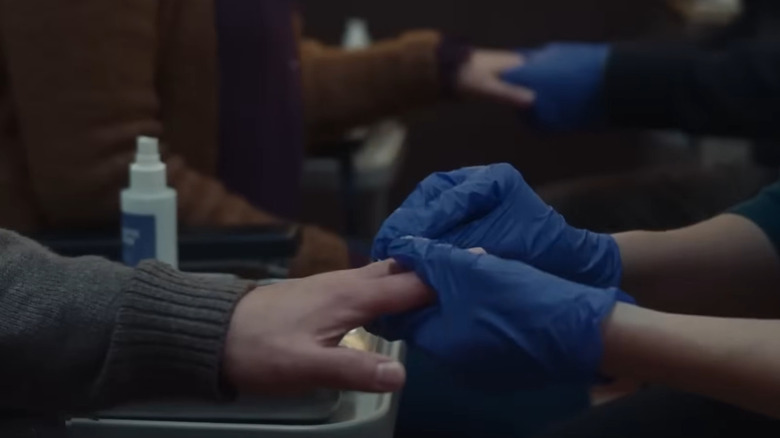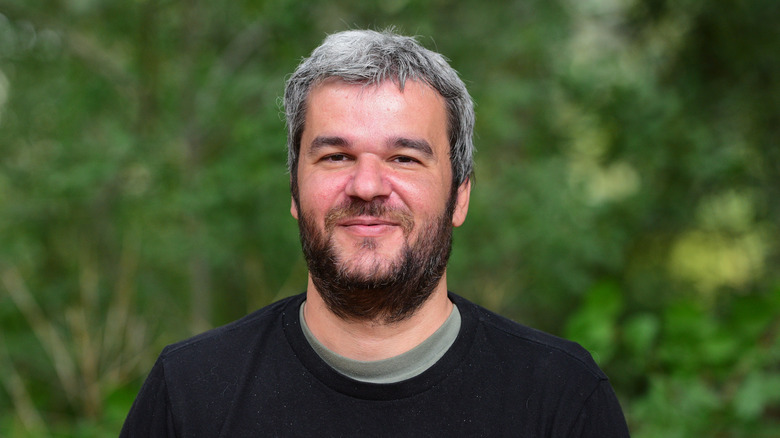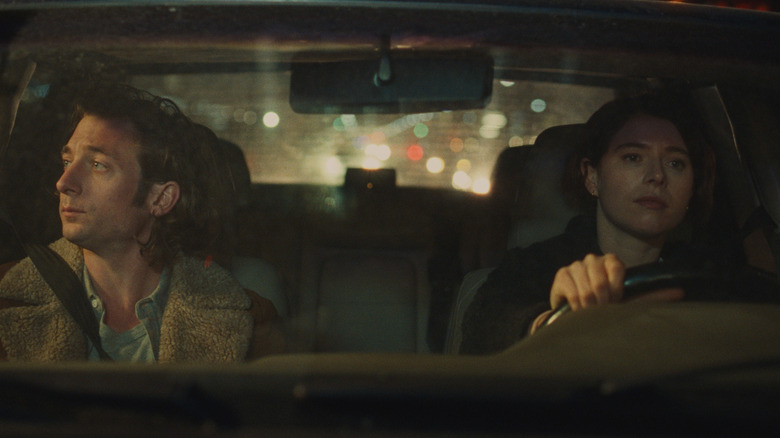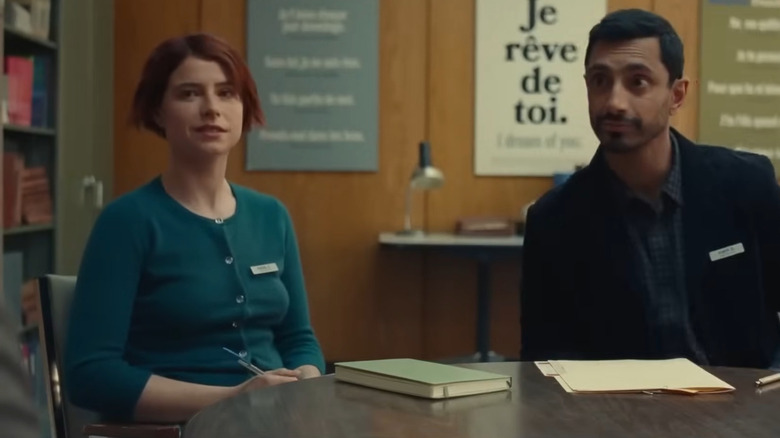The Ending Of Fingernails Explained
Contains spoilers for "Fingernails"
With his sophomore outing, Greek director Christos Nikou gives audiences a melancholy, sci-fi-tinged romance starring Jessie Buckley, Jeremy Allen White, and Riz Ahmed. "Fingernails" takes place in an alternate version of the present-day or the near future, in which scientists have developed a love machine that claims to identify if two people are truly soulmates. If they score 100%, they're both in love, if they score 0%, neither is in love, and if they score 50%, only one is in love. Simple enough, right? Well, in theory, anyway.
With a cast filled with some of the hottest rising stars and an intriguing premise, Nikou seems poised to establish himself as one of the most interesting new writers and directors on the scene today, developing high-concept pieces that immediately grab audiences' attention. But with this kind of light science-fiction romance, "Fingernails" gives us plenty to think about in terms of what it all means, especially in the film's ambiguous final moments. If you're left with questions, we're here to delve into the ending of "Fingernails," so that you can leave the film feeling as though you've got a firm grasp on its message and what it means.
What you need to remember about the plot of Fingernails
Anna (Jessie Buckley) is a born romantic. She's content in the knowledge that she and her boyfriend Ryan (Jeremy Allen White) are in love — and they can prove it because they live in a society that has the technology to determine whether or not couples are soulmates. Having the certificate of scientifically guaranteed love comes as a relief to most people, who no longer need to waste mental energy thinking about whether or not their partner is right for them, and all it takes is ripping off one of your fingernails for analysis.
She's all in on this new technology and even decides to take a job at the Love Institute working with couples as they gear up to take the test that will determine the entire course of their future. But things get a little complicated the more she works with Amir (Riz Ahmed), one of her colleagues and a man with whom she has pretty significant chemistry. But she can't actually have feelings for him, right? After all, the machine already proved that she is in love with Ryan, and her boss assured her that it's impossible for one person to test positive with two prospective partners. Despite this knowledge, she can't help but think about whether or not the two of them might make a love match.
What happened at the end of Fingernails
The more time they spend together, the more the temptation grows, and after Amir rips off one of his fingernails to reassure one of their clients that it's not actually that painful, Anna can't resist the urge to use it to test the compatibility between her and Amir. The results are inconclusive: They receive 50%, which means that one of them is in love, but not both. This doesn't help Anna, because she has no way of knowing whether she loves Amir, or if he loves her. She even convinces Ryan to go back in for a re-test, to see if their feelings have changed, but they still receive a positive rating that indicates they are as much in love as ever — even if they seem increasingly disconnected from one another. This should be the end of Anna's concerns, but she's still confused — how can she feel so strongly for two different people, and how can she figure out which one of them she actually loves?
By the end of the film, Amir and Anna can repress their feelings no longer, and when she leaves Ryan at home under the pretense of going out to get soup, she turns up at Amir's apartment, and they consummate their relationship with one another. Afterward, Anna goes into the kitchen and uses pliers to pull off each of her remaining fingernails. Amir stops her before she's able to finish the job, and they sit together in uncertain silence as he comforts her.
Love can't be quantified
Throughout the entire film, the machine's validity is never questioned. People seem to take their results as gospel, ending relationships immediately after receiving a 0% score suggesting that they're not really in love. After all, what's the point in continuing to date someone if science is telling you they're not the one? The Love Institute runs courses that put couples through different intimacy experiences, and there's the dim hope that they might fall in love with each other after putting in enough work, but they also admit that results rarely change. Still, Amir acknowledges that he finds it difficult to predict which couple will have a positive score and which will have a negative score, even after spending a great deal of time with them, and often the ones who seem genuinely in love fail their test. There's seemingly no rhyme or reason for how the test turns out, yet people build their entire lives around it.
Anna seems like a true believer in this system, which is why it's so surprising that she ends up tearing off all her fingernails in the film's finale. This seems to be an act of rebellion, a choice once and for all to reject the results of the love machine. With no more fingernails, she won't even have the option of retesting with either Amir or Ryan — not for a while, anyway — taking her romantic decisions into her own hands rather than relying on a computer to tell her whether or not she has feelings for someone.
Or can it?
There's also another interpretation of the film's closing scene — although it is one that admittedly makes less sense within the overall narrative. Anna has complete faith in this technology, and although she questions her own feelings, that doesn't necessarily mean that she questions the science behind the test to which she has chosen to devote her entire professional life. Maybe when she frantically tears off her nails in the kitchen, it's a desperate attempt to get more samples. Maybe the fact that she doesn't have a scientifically verified answer as to who she loves is eating her alive, and she impulsively makes this choice so that she and Amir can test again ... and again if need be. Sure, she would have to convince him to sacrifice one or two of his own fingernails, but it's a small price to pay for true love.
Still, this isn't a narratively satisfying ending. After Anna has made the decision to begin a sexual relationship with Amir in spite of what the test says, it would be a character arc regression for her to pedal backward and put her faith in the test again. But considering how much of a devotee she had been to the Love Institute, it isn't outside the realm of possibilities that she could panic and retreat to the safety of her deeply held beliefs rather than fling herself into a relationship that may or may not work out.
Where does Amir stand?
Amir works for the Love Institute, so presumably he believes in its mission statement and the science behind the test. He seems to genuinely want to help the couples that come through their doors, whether it's with his mentorship — as he runs the classes that are meant to bring them closer together — or in helping to facilitate their moment of truth as they take the test together. Although Amir initially claims to be dating Natasha (Annie Murphy), it is later revealed that she's just his neighbor, and he pretends to have a significant other because it might look strange for a single man to be working at the Love Institute teaching couples how to strengthen their relationships. The truth is that he's single and seems to be holding out hope that he'll find someone with whom he can pass the test.
When Amir runs into the kitchen and attempts to stop Anna from pulling off the rest of her fingernails, his primary objective is to prevent her from hurting herself (after all, ripping out your nails with kitchen pliers and no anesthetic hardly seems like a good time). But if her actions can be seen as a rejection of the test, are his efforts to stop her a rebuke of that rejection? They seem to have a great deal of chemistry and are fond of one another, but it's also possible that this is a one-off blip rather than the beginning of a romance, and that they could go back to their normal lives and say no more about it.
Commentary on social media and digital connection
You used to meet people in person, perhaps striking up a conversation with someone at a bar or being introduced to someone through a friend of a friend. Now, as our worlds grow simultaneously larger and much smaller, we're forced to increasingly rely on social media and dating apps to foster connections. We may not have a literal test to prove whether or not we're in love, but we have algorithms that filter out undesirable romantic candidates, leaving us with a smaller and scientifically selected pool of potential love interests.
The test in "Fingernails" is contradictory: It seems to streamline the process of romance, taking out the uncertainty of dating by proving when two people are soulmates, but most of the characters seemed riddled with anxiety over why they're not feeling more connected with someone they are supposed to be in love with. This is not entirely dissimilar to the modern dating scene, one that claims to make things easier by helping people find individuals who have the exact qualities they're looking for, but the fact that there are so many options overcomplicates it all. To find a similar metaphor, the more films and television shows there are on a streaming service, the less likely you are to find something to watch. It's kind of like that with modern online dating.
Why fingernails?
A fingernail might seem like an arbitrary choice to be the subject of this love test — aside from being particularly gruesome to remove on camera, creating a sense of body horror within an otherwise warm sci-fi romance — but in the eyes of Christos Nikou, it was entirely intentional. Although the production team initially brainstormed different body parts that could serve as the samples offered up to the EZ-Bake Oven style love machine, they landed on fingernails because of their potential as a metaphor in terms of the role they play in our connection with technology. In an interview with Collider, Nikou discussed the reason why he ultimately chose fingernails, saying, "Our cell phones are the extensions of our fingers, and somehow right now, love goes through cell phones and love goes through technology. We're looking for answers on our cell phones about finding love and connection. I think that's why we wanted to find something that is a part of our hands."
He went on to highlight the literal link between fingernails and the heart, explaining, "we found this scientific fact that says that the first sign when you have problems with your heart are white spots on your fingernails."
What has the director said about Fingernails?
With Christos Nikou's debut film "Apples," the director seemed particularly interested in exploring existential crises and the truth of both how we see ourselves and how we behave in interpersonal relationships. He continues this line of thought in "Fingernails." In a panel discussion at the Toronto International Film Festival (via Deadline), Nikou explained that the origin of the film — which he also wrote — came from him trying to understand his personal life, and the relationships between many of his friends. "I was trying to understand the last years of my life, in a personal way, but I was also looking at a lot of friends around me and some couples that I know. I wanted to know, 'What is going on with love? Why is love a little bit different and more difficult right now? Why are people meeting only through dating apps and social media?'"
He saw these essential questions as a springboard for the mechanized love test in "Fingernails," and the complicated relationships between the main characters that are completely defined by their reliance on and absolute faith in technology. He went on to elaborate, "They're using technology in order to find love and also to find some answers around love. So that was the initial idea."
How critics reacted to Fingernails
Although many critics seemed enchanted with the premise of "Fingernails" – Robert Daniels of RogerEbert.com praised its "quiet soulfulness" while Alissa Wilkinson of Vox called it "funny and ultimately heartwrenching" — they seemed less sold on the ending of the film. Todd McCarthy of Deadline was disturbed by the more gruesome aspects of the film (and particularly the finale), referring to it as "robustly repellent" and writing that its ending "will likely prove edifying, appealing and/or interesting to about 0.10 percent of the audience. Not to put too fine a point on it, but it's revolting."
Maureen Lee Lenker of Entertainment Weekly was thrown off by how much "Fingernails" relies on the grotesque, summing up her qualms about its narrative choices by saying, "The film is undercut by its use of body horror, needlessly depicting the fingernail removal process multiple times. Its discomfort feels deliberate, but it goes too far, which only serves to reduce the emotional impact overall as it begins to feel gross and silly, rather than profound."
Still, not all critics were equally repelled. Guy Lodge of Variety found its elements of body horror ultimately bolstered the narrative, writing of the fingernail-pulling, "It's a small, malevolently grisly body-horror detail in a film otherwise given to tender expressions of philosophy and feeling, and a shock of the visceral that draws attention to how disembodied this social ideal of romance appears to be."
Will there be a sequel to Fingernails?
"Fingernails" certainly ends on an ambiguous enough note that it could warrant a sequel. Will Anna and Amir stay together, or will she go back to Ryan? If there is something wrong with the love test, and it's not actually as reliable as the Love Institute suggests, what is the fallout of that? Have miserable couples just been staying together because they have a positive test result and trust that more than their own feelings? This world is full of possibilities for future narratives, either one involving Anna and Amir or exploring entirely different characters.
That said, it seems unlikely that "Fingernails" will actually get a sequel. Director Christos Nikou has only ever made standalone films (to be fair, this is only his second feature-length movie, so there isn't exactly a huge sample size), and this feels like it was meant to be one-and-done. Additionally, "Fingernails" is distributed by Apple TV+, and although some streaming services take every opportunity to churn out follow-up films to their original content, Apple has yet to generate a single sequel to any of its films. As much as we might want to further explore the world of "Fingernails," audiences should probably be resigned to not seeing any more of it.
